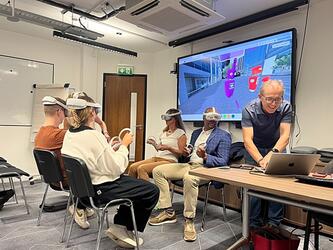We ran our first focus group in the metaverse, and this is what happened

For more than 80 years, the in-person focus group has been a go-to tool for gleaning insight from consumers. As with any methodology, it has its advantages (ability to easily observe non-verbal cues, interactions between respondents, clients and researchers working together on-site, and of course, M&Ms!) and disadvantages (group think, cost of travel and facilities, inconvenience for participants).
Then along came the pandemic in early 2020, and almost overnight nearly all in-person focus groups shifted online. Online focus groups have their own set of advantages (less expensive, natural participant environment, easier geographical representation) and disadvantages (technology challenges, participant distractions, difficulty making human connections).
Now, virtual and augmented reality are opening up the market research world to new and exciting methods of interacting with consumers. When our agency launched its metaverse in early 2022 we wondered: Could we run a focus group in the metaverse? Would participants respond differently by presenting themselves as avatars?
In April 2022, Wunderman Thompson’s research and insights team recruited a diverse group of avid gamers to meet up as avatars in Wunderman Thompson’s metaverse for a moderated conversation on inclusion and the metaverse. We discussed identity and representation, social and cultural concerns, and how consumers envision brands playing a role in the metaverse.
Here, we share some of the key takeaways from our foray into this space, and some implications for researchers and marketers.
- Anonymity appears to drive deeper discussions and more authentic representations
One of the most interesting observations was how participants’ perceived sense of anonymity – due to the use of avatars and the lack of their image on video – seemed to give them permission to ‘open up’ more quickly compared to traditional in-person and online focus groups. The ‘masking’ of their visual identity appeared to paradoxically – consciously or unconsciously – allow them to reveal more of their authentic identity.
While the metaverse offers participants the opportunity to escape their reality and ‘show up’ as someone else, participants said that they would prefer to tailor their avatars as their true selves in a metaverse focus group setting, as they said they felt more comfortable opening up when portrayed by an avatar that stayed true to their real-world self. Participants stressed the importance of avatar representations like red hair or braids, religious adornments like a hijab or a cross, or avatar aids such as glasses or a wheelchair.
- The metaverse could offer a space to conduct research with harder-to-recruit audiences
Our participants – avid gamers – took to the metaverse like fish to water, much better than those of us conducting the focus group. Early adopters of the metaverse will likely be younger and more comfortable in digital spaces. As younger consumers, especially younger males, become harder to recruit for both qualitative and quantitative research, the metaverse could be a way to connect with them where they already choose to spend their time.
- More ‘real world’ testing of prototypes and ideas
Consumers are notoriously poor at seeing the benefit and innovation of things until they experience them. Once the functionality allows for it, the metaverse could provide an opportunity for consumers to interact with prototypes and new products, explore new store layouts, and test new experiences and processes. Consumers will also have the ability to manipulate products and go on virtual shopping trips.
- Accessibility and anonymity for healthcare (or other highly sensitive research)
There appear to be many opportunities and benefits for healthcare research, in particular. The metaverse provides a layer of anonymity for those with health conditions. Some patients with advanced conditions cannot easily access to a physical location for interviews, or prefer not to be on camera for digital interviews.
The metaverse provides a more interactive and personal form of communication than telephone without someone needing to be on camera or in person. Researchers can also create digital spaces to allow for testing in mock settings, such as a doctor’s office or hospital. Additionally, it serves as a forum to hold focus groups on sensitive topics where consumers might otherwise not want to interact in a group setting.
- Quality of research will increase as knowledge of metaverse technology grows and avatars become more sophisticated
While there is much opportunity for the metaverse to play a role in the future of market research, there is also likely to be a significant learning curve as both moderators and participants learn the technical side of communicating in this space. The metaverse is still in its infancy and currently has limitations (e.g., avatars only, no facial expressions, limited functionality overall, etc.) that can make it challenging to stimulate conversation between participants or to know when someone has something to say.
There is also a lack of non-verbal cues, such as head nods, smiles and signs of engagement or disengagement, which required our moderator to spend more time prompting participants to share their feelings and respond to others’ comments. Over time, advancements to augmented reality that make the experience more immersive and realistic should help to address these issues.
We envision the metaverse is likely to serve as an additional methodology in the research toolbox rather than a replacement for existing methodologies. More sophisticated and accessible digital spaces, cameras, virtual and augmented reality, and other technologies will only enhance the research possibilities in this realm. As the reality of what the metaverse can offer ultimately becomes starts to become clearer, we’re excited to continue exploring the ways it can aid the research process.
Amy Song and Diana Orrico are directors of brand intelligence at Wunderman Thompson

We hope you enjoyed this article.
Research Live is published by MRS.
The Market Research Society (MRS) exists to promote and protect the research sector, showcasing how research delivers impact for businesses and government.
Members of MRS enjoy many benefits including tailoured policy guidance, discounts on training and conferences, and access to member-only content.
For example, there's an archive of winning case studies from over a decade of MRS Awards.
Find out more about the benefits of joining MRS here.












0 Comments